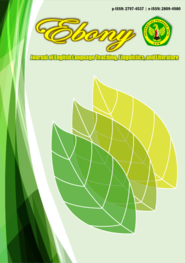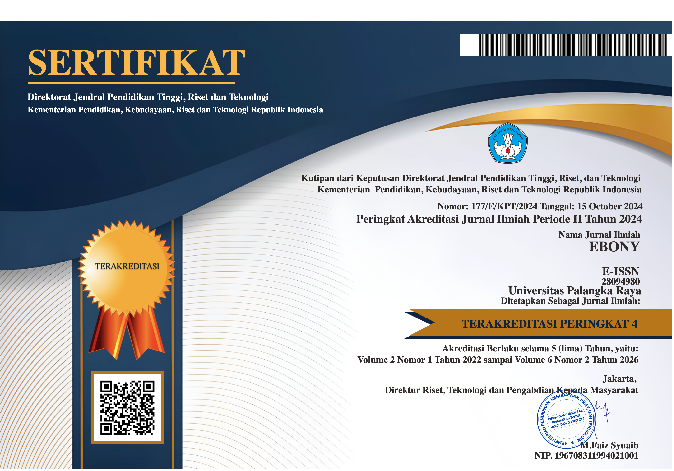Designing e-Local Content of Teaching Materials for Extensive Reading Course: Lecturer’s Voice
DOI:
https://doi.org/10.37304/ebony.v2i1.4031Keywords:
local content, electronic materials, extensive reading courseAbstract
This research focus on designing e-local content of teaching materials for extensive reading course: Lecturer’s voice. It applied R&D based on ADDIE MODEL. ADDIE means Analysis, Design, Development, Implementation and Evaluation. Furthermore, Interview and questionnaire as the instrument of collecting data. The result of this research revealed that the lecturers interested to use this reading material for teaching extensive reading course. It is proved by the positive response given by the lecturer. From 19 distributed questions, 18 questions has Yes response (1). The percentage of the score 1 is 100%, and it categorized as excellent. Moreover, 1 question has No (0)response, and the category of score 0 is poor. Refers to the gathered score, the E-Local Content of teaching materials is feasible to use as the appropriate reading materials for teaching extensive reading course based on lecturer’s voice.
Downloads
References
Agustina, L., Harahap, A., & Syahrial. (2018). Developing Reading Material Based-on Local Culture for Junior High School in Kabupaten Rejang Lebong. Journal of Applied Linguistic and Literature, 3(1), 1–14.
Ajoke, A. R. (n.d.). The Importance of Instructional Materials in Teaching English as a Second Language. www.ijhssi.org
Arkorful, V., & Abaidoo, N. (2014). The role of e-learning, advantages and disadvantages of its adoption in higher education. Ijern, 2(2), 397–410.
Branch, R. M. (2009). Instructional Design: The ADDIE Approach. In Instructional Design. Springer Science+Business Media.
Delfi, S., & Yamat, H. (2017). Extensive Reading in Developing Language Competency for Indonesian EFL Learners Majoring in English. IJELTAL (Indonesian Journal of English Language Teaching and Applied Linguistics), 1(2), 153. https://doi.org/10.21093/ijeltal.v1i2.20
Ferdila, R. (2014). the Use of Extensive Reading in Teaching Reading. Journal of English and Education, 2014(2), 68–80.
Fergina, A. (2019). Preserving Local Wisdom Through Extensive Reading Book “ Traditional Games Of Indigenous People In West Kalimantan .” UHAMKA International Conference on ELT and CALL (UICELL, November, 21–22.
Forrester, R. (2016). Guttman Scale Analysis and Its Use to Explain Cultural Evolution and Social Change. SSRN Electronic Journal, 1–7. https://doi.org/10.2139/ssrn.2866015
Gustaf, D. (2015). Designing A Comic Book for Extensive Reading Material for 8 the Grade Students of SMP N 2 Sanden. State University of Yogyakarta.
Husain, S., Panai, A. H., Abbas, N., & Uno, H. B. (2019). Development of Local Content Learning Module for Karawo Embroidery Crafts in Vocational High Schools in Gorontalo. Journal of Education and Practice, 10(15), 66–76.
Kusuma, I. P. I. (2016). DEVELOPING READING MATERIAL FOR ELEMENTARY STUDENTS IN TOURISM AREA BY INSERTING LOCAL CULTURE. JEELS (Journal of English Education and Linguistics Studies), 3(1). https://doi.org/10.30762/jeels.v3i1.176
Manurung, K. (2017). DESIGNING INSTRUCTIONAL MATERIALS (I, Issue July). UNTAD Press.
Monica, S., & Vianty, M. (2019). Developing Local Content-Based Instructional Graded Reading Materials for Reading Level Three Students. Linguistic, English Education and Art (LEEA) Journal, 3(1), 1–16. https://doi.org/10.31539/leea.v3i1.792
Puspitasari, E. (2019). “I Love Creepy Pasta”: EFL Students’ Book Selection for Extensive Reading. Advances in Social Science, Education and Humanities Research, 353(IcoSIHESS), 50–55. https://doi.org/10.2991/icosihess-19.2019.8
Rapanta, C., Botturi, L., Goodyear, P., Guàrdia, L., & Koole, M. (2020). Online University Teaching During and After the Covid-19 Crisis: Refocusing Teacher Presence and Learning Activity. Postdigital Science and Education, 2(3), 923–945.
Downloads
Published
How to Cite
Issue
Section
License

This work is licensed under a Creative Commons Attribution-NonCommercial 4.0 International License.











